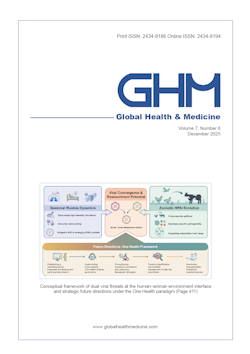Global Health & Medicine 2020;2(5):273-281.
Hepatocyte ploidy and pathological mutations in hepatocellular carcinoma: impact on oncogenesis and therapeutics
Yamazoe T, Mori T, Yoshio S, Kanto T
Hepatocellular carcinoma (HCC) occurs in the chronic liver inflammation such as viral hepatitis, alcoholic and non-alcoholic steatohepatitis. While anti-viral treatment has been significantly improved, the prevalence of HCC remains high and treatment is still challenging. The continuation of hepatocyte death, inflammation, and fibrosis leads to the accumulation of gene alterations, which may trigger carcinogenesis. Hepatocytes are a unique cell type having more than one complete set of 23 chromosomes, termed polyploidy. Due to gene redundancy, hepatocytes may tolerate lethal mutations. Next generation sequencing technology has revealed gene alterations in HCC related to telomere maintenance, Wnt/β-catenin pathway, p53 cell-cycle pathway, epigenetic modifiers, oxidative stress pathway, PI3K/AKT/mTOR, and RAS/RAF/MAPK pathway with or without a chromosomal instability. Some type of driver gene mutations accumulates in hepatocytes and breaks the orchestration of excessive copies of chromosomes, which may lead to unfavorable gene expressions and fuel tumorigenesis. Recently, molecular targeted drugs, developed with the aim of interfering with these signaling pathways, are being used for HCC patients in the clinics. Therefore, a deeper understanding of hepatocyte ploidy and genetic or epigenetic alterations is indispensable for the establishment of novel therapeutic strategies against HCC.
DOI: 10.35772/ghm.2020.01089







